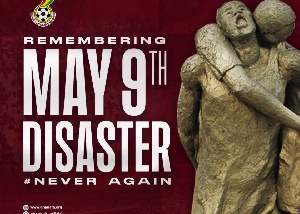- Home - News
- Elections 2024
- News Archive
- Crime & Punishment
- Politics
- Regional
- Editorial
- Health
- Ghanaians Abroad
- Tabloid
- Africa
- Religion
- Photo Archives
- Press Release
General News of Friday, 9 May 2025
Source: www.ghanawebbers.com
Remembering May 9th Accra Sports Stadium Disaster, 24 Years On
Twenty-four years ago today, a tragic event occurred in Ghana. On May 9, 2001, a football match between Accra Hearts of Oak and Asante Kotoko turned deadly. This day is remembered as the darkest in Ghana’s sports history. A total of 126 people lost their lives at the Accra Sports Stadium. The disaster changed Ghanaian football forever.
The match started with excitement. Hearts of Oak made a dramatic comeback, winning 2–1. However, chaos erupted after the game ended. Kotoko fans were angry about a referee's decision and their team's loss. They began throwing bottles and plastic seats onto the pitch.
Riot police responded by firing tear gas into the crowd. Panic spread quickly as thousands tried to escape. Many gates were locked, making it hard to get out. Poor stadium design created dangerous bottlenecks for fans trying to flee. Tragically, this led to a fatal crowd crush.
In just one hour, 116 people died from compressive asphyxia and 10 more from trauma. Families were devastated, and the nation mourned deeply. One fan, Abdul Mohammed, was mistakenly thought to be dead. He regained consciousness in the morgue when someone stepped on his foot.
Eyewitness accounts revealed serious issues at the stadium. The Ghana Institute of Architects called it a “death trap.” Medical staff had left before the disaster began, and many exits were locked. An inquiry found police used excessive force and acted negligently.
Six officers faced charges for manslaughter but were acquitted due to lack of evidence. In response to this tragedy, President John Agyekum Kufuor declared three days of mourning. The Premier League was suspended for a month afterward.
In 2007, renovations brought the stadium up to FIFA standards but maintenance issues remain today. From this tragedy emerged a culture of remembrance led by Herbert Mensah, former Asante Kotoko chairman. The May 9th Remembered movement includes street walks and memorials each year.
Annual tributes have become part of Ghana’s sporting calendar since then. In 2016, they introduced the symbolic “May 9th Cup.” A bronze statue titled “I Am My Brother’s Keeper” now stands outside the stadium as a reminder of compassion during crises.
Despite these efforts, some believe more action is needed. Mensah has urged the government to recognize May 9th as a national day of remembrance but has not succeeded yet.
As Ghana reflects on this solemn anniversary, one truth remains clear: May 9th is not just history; it calls for vigilance and empathy moving forward.











